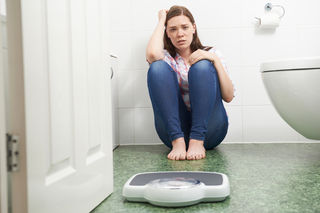Diet
5 Things You Need to Know About How Your Weight Works
... and why no one is immune to poor body image.
Posted April 28, 2016

As a psychologist, I’ve worked with hundreds of women, and quite a few men, struggling with chronic dieting, overeating, and body hating. One of the many things that I love about my job is that every person comes with his or her own unique story. But after you have heard hundreds—maybe thousands—of these stories, some universal themes start to emerge.
These are 5 lessons my patients have taught me about our cultural obsession with weight loss. My hope is that these lessons will help you out of the dieting/overeating/shame/self-hatred cycle—because the most important lesson that I’ve learned is: There is a way out, and the solution isn’t always what you think it is.
1. Body image has absolutely nothing to do with weight.
When I first opened my practice specializing in the treatment of overeating and body-image concerns, I thought that I would be working with a lot of people classified as “overweight” or “obese.” This turned out to be anything but the truth. Body hatred does not discriminate by size. I clearly remember the first time I really understood this: I went into my waiting room to meet a woman who had told me on the phone that she was seeking help because she hated her appearance so much that it was at times difficult for her to leave her home. I did a double take when I saw a tall svelte woman who met every criterion of traditional beauty standards. As she came into my office and tearfully described her self-hatred and abusive relationship with food, I realized that there is a pain shared by every individual who has waged war against her body, regardless of body size.
2. Changing your body is not the answer.
We are brainwashed to believe that if our body looks the way we want it to—if it looks the way that the “experts” tell us it is supposed to—then we will finally stop hating ourselves so much. This is not true. Have you ever looked back on a picture of yourself from a time that you were thinner and thought, “I looked so good then, why didn’t I appreciate it? If only I could get back to that weight, this time I would be happy.” Nope. You weren’t happy when you were at that weight and in all likelihood you won’t be happy if you get back there—because body image has absolutely nothing to do with your weight. (See #1.)
3. Dieting does not work.
Even if losing weight did improve the way you felt about yourself, the problem is that there is no good way to do it. I learned this lesson during my years as an obesity researcher. I attended conferences where I heard the results of millions and millions of dollars of government-grant-funded research conducted by the world's leading obesity experts, and everything pointed to the same conclusion: No one has any clue how to get people to lose weight and keep it off long-term. Any study that includes a significant follow-up period has had dismal results. This is why we don’t see "The Biggest Loser" reunion shows: Most are fat again.
4. Issues with food don’t necessarily go away when you address other emotional issues.
I’ve had a lot of patients who have come to me after years of psychotherapy—often very good psychotherapy; treatments in which these patients have made meaningful progress and changes in many areas of their lives. But even when the depression, anxiety, or relationship issues improve, the food and body issues often remain. Despite the fact that overeating is often triggered by underlying emotional issues, it seems as though resolving those emotional issues is not enough to free us from our tormented relationship with food and our body.
5. There is a way out.
... and it involves starting to work with your body rather than against it. Fighting against our own body is always a losing battle—after all, it has us fighting against physiological drives developed through evolution to keep us alive. But when we can harness those drives in the service of guiding our eating, then we have a powerful tool that can lead us out of the hellish situation we’ve found ourselves in. This process involves acceptance, compassion, mindful and/or intuitive eating, and a big leap of faith to acknowledge that, no, this new diet will not be the answer. That can be scary, but when you can get there, it is oh-so-freeing.
To learn more about Dr. Conason, The Anti-Diet Plan, and Mindful Eating, visit her at www.drconason.com, follow her on twitter @ConasonPsyD, and like her on Facebook.


